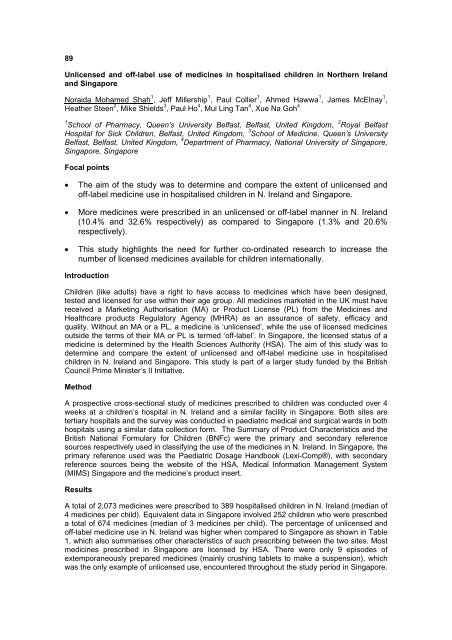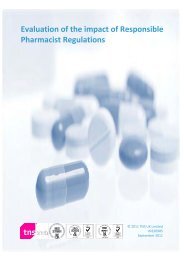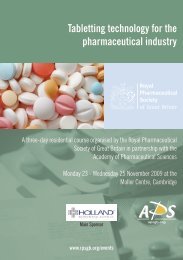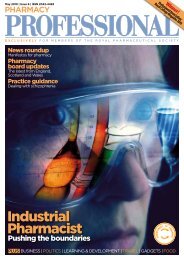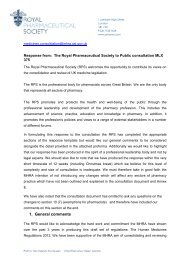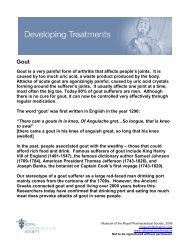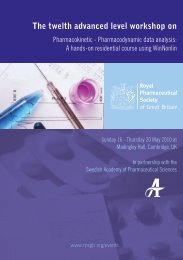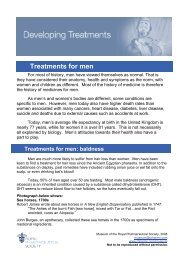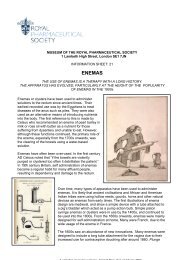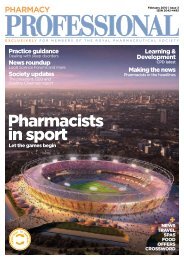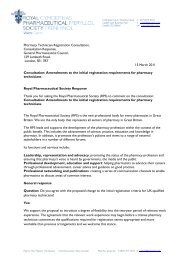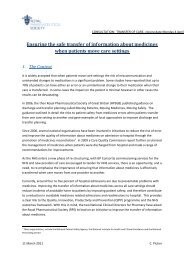RPS Conference 2010, Abstracts 2010 - Royal Pharmaceutical Society
RPS Conference 2010, Abstracts 2010 - Royal Pharmaceutical Society
RPS Conference 2010, Abstracts 2010 - Royal Pharmaceutical Society
You also want an ePaper? Increase the reach of your titles
YUMPU automatically turns print PDFs into web optimized ePapers that Google loves.
89<br />
Unlicensed and off-label use of medicines in hospitalised children in Northern Ireland<br />
and Singapore<br />
Noraida Mohamed Shah 1 , Jeff Millership 1 , Paul Collier 1 , Ahmed Hawwa 1 , James McElnay 1 ,<br />
Heather Steen 2 , Mike Shields 3 , Paul Ho 4 , Mui Ling Tan 4 , Xue Na Goh 4<br />
1 School of Pharmacy, Queen’s University Belfast, Belfast, United Kingdom, 2 <strong>Royal</strong> Belfast<br />
Hospital for Sick Children, Belfast, United Kingdom, 3 School of Medicine, Queen’s University<br />
Belfast, Belfast, United Kingdom, 4 Department of Pharmacy, National University of Singapore,<br />
Singapore, Singapore<br />
Focal points<br />
• The aim of the study was to determine and compare the extent of unlicensed and<br />
off-label medicine use in hospitalised children in N. Ireland and Singapore.<br />
• More medicines were prescribed in an unlicensed or off-label manner in N. Ireland<br />
(10.4% and 32.6% respectively) as compared to Singapore (1.3% and 20.6%<br />
respectively).<br />
• This study highlights the need for further co-ordinated research to increase the<br />
number of licensed medicines available for children internationally.<br />
Introduction<br />
Children (like adults) have a right to have access to medicines which have been designed,<br />
tested and licensed for use within their age group. All medicines marketed in the UK must have<br />
received a Marketing Authorisation (MA) or Product License (PL) from the Medicines and<br />
Healthcare products Regulatory Agency (MHRA) as an assurance of safety, efficacy and<br />
quality. Without an MA or a PL, a medicine is ‘unlicensed’, while the use of licensed medicines<br />
outside the terms of their MA or PL is termed ‘off-label’. In Singapore, the licensed status of a<br />
medicine is determined by the Health Sciences Authority (HSA). The aim of this study was to<br />
determine and compare the extent of unlicensed and off-label medicine use in hospitalised<br />
children in N. Ireland and Singapore. This study is part of a larger study funded by the British<br />
Council Prime Minister’s II Initiative.<br />
Method<br />
A prospective cross-sectional study of medicines prescribed to children was conducted over 4<br />
weeks at a children’s hospital in N. Ireland and a similar facility in Singapore. Both sites are<br />
tertiary hospitals and the survey was conducted in paediatric medical and surgical wards in both<br />
hospitals using a similar data collection form. The Summary of Product Characteristics and the<br />
British National Formulary for Children (BNFc) were the primary and secondary reference<br />
sources respectively used in classifying the use of the medicines in N. Ireland. In Singapore, the<br />
primary reference used was the Paediatric Dosage Handbook (Lexi-Comp®), with secondary<br />
reference sources being the website of the HSA, Medical Information Management System<br />
(MIMS) Singapore and the medicine’s product insert.<br />
Results<br />
A total of 2,073 medicines were prescribed to 389 hospitalised children in N. Ireland (median of<br />
4 medicines per child). Equivalent data in Singapore involved 252 children who were prescribed<br />
a total of 674 medicines (median of 3 medicines per child). The percentage of unlicensed and<br />
off-label medicine use in N. Ireland was higher when compared to Singapore as shown in Table<br />
1, which also summarises other characteristics of such prescribing between the two sites. Most<br />
medicines prescribed in Singapore are licensed by HSA. There were only 9 episodes of<br />
extemporaneously prepared medicines (mainly crushing tablets to make a suspension), which<br />
was the only example of unlicensed use, encountered throughout the study period in Singapore.


